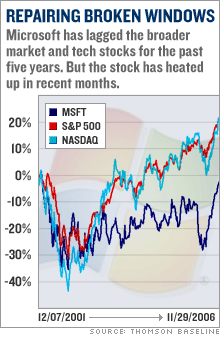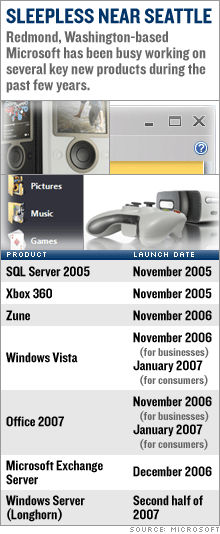Welcome back, MicrosoftStock Spotlight: With Vista, Office 2007, the Zune and Xbox, the software giant's finally got its groove back.NEW YORK (CNNMoney.com) -- After Microsoft announced a delay in its new operating system, Vista, for consumers back in March, investors hacked more than 20 percent off the company's stock price in a matter of months. But since July, Microsoft's stock has jumped about 35 percent and is now flirting with $30 - a level it has not traded above in several years.
The ascent is fueled by optimism about Vista, which was released to businesses on Thursday and will be available to consumers at the end of January, and confidence that the Xbox 360 game console, which was released last year, will enjoy a profitable holiday season. Still, Microsoft (Charts) is a company in transition. It was one of the better performing stocks of the 1980s and 1990s thanks to its Windows platform and Office suite of software. But it has watched other companies surpass it in recent years. Google (Charts) dominates the lucrative world of online advertising, leaving Microsoft's MSN a distant third in the Web search business. And Microsoft rival Apple (Charts) remade itself as the leader of the digital music world with the success of the iPod and iTunes music store. This wave of competition has left some wondering what Microsoft's plan for the future is. "They're playing catch up," said Robert Breza, an analyst with RBC Capital Markets. To that end, Microsoft has revamped MSN and also recently released Zune, a digital music player that will compete with the iPod. But Breza also thinks that because of all the new products Microsoft has on tap, the company is once again starting to look like a growth stock. The view on Vista Vista is the premier product in Microsoft's lineup, a new operating system to replace the successful XP. Analysts think consumers will like Vista thanks to enhancements that should boost computer performance as well as make it easier for users to search for files regardless of media type. "Architecturally, it's a big change," says Charlie Di Bona, an analyst at Sanford Bernstein, adding that it will be important for Microsoft to quickly get consumers to switch to Vista. As such, Microsoft has announced an upgrade program to entice them. Under the program PC makers Dell (Charts), Hewlett-Packard (Charts), Gateway and Sony are selling computers with coupons that allow consumers to upgrade to Vista for free or a "nominal cost" when available, with Microsoft making most of its money off Vista from the PC makers. Heather Bellini, an analyst with UBS, is optimistic that Vista will lead to strong sales growth for Microsoft in 2007. She thinks revenue growth from its operating system business, which makes up more than 30 percent of total sales, could be higher than PC shipment growth industrywide. Sales of Windows usually track overall PC sales. In fact, the last time Microsoft's operating system revenue rose faster than PC sales was when XP was launched. But not everyone is in agreement about what Vista's rollout will do for Microsoft in the near-term. Richard Williams, an analyst with ICAP, thinks many large companies won't touch Vista until its first security update comes out in the second quarter of 2007. Following? Or Leading? Although Vista is among the most watched products due out from Microsoft, it is by no means the only one. The company's Exchange Server 2007, an upgrade to its corporate messaging software, also came out on Thursday. And Microsoft Office 2007 is now available for businesses. It will be launched for consumers in January. Alexander Motola, portfolio manager for Thornburg Investment Management, which owns shares of Microsoft, thinks many consumers will want to switch to Office 2007 quickly since they won't be able to easily read documents created on earlier versions of Office. Personal media player, Zune, on the other hand, is a more of a headscratcher. No one expects it to cut into Apple's iPod sales significantly. After all, others have already tried to do so and mainly failed because as Motola says, "the iPod isn't broken." But the true significance of Zune, like Xbox 360, could be where it places Microsoft in the future. Many tech companies are seeking a central place in the living room with a device or devices that could one day control a user's TV, allow them to download movies and host their music library, analysts said. Plus, Microsoft has proven to be patient. It doesn't need to overtake the iPod immediately. "Five years ago everyone said they were crazy to roll out Xbox against PS 2 and Nintendo's Game Boy," RBC's Breza says. "But there will be disruptions. Microsoft has the strength to outlast competitors." And to be sure, Sony's PS3 has been beset by inventory problems and compatibility issues. Of course, Microsoft is by no means immune from disappointments. MSN, for example, was built as a portal site with banner advertisements in the spirit of Time Warner's AOL and has since, like AOL, been dwarfed by Google and Yahoo (Charts). (Time Warner also owns CNNMoney.com). Microsoft's online services business, which includes MSN, reported a decline in revenue in its most recent quarter and posted an operating loss. "MSN hasn't really been a particularly successful business for Microsoft," said Motola. Windows of opportunity While Microsoft's had a volatile year, analysts are encouraged by the stock's recent rally. Analysts noted that Microsoft is still relatively inexpensive, trading at 17.6 times estimated earnings for its next fiscal year, which ends in June 2008. That's reasonable considering that Wall Street expects earnings to jump 16 percent that year. "And estimates are conservative at this point. There's more room for upside," said UBS' Bellini. She has a "buy" rating on the stock with a target price of $33 for 2007, about 12 percent above current levels. With all of its new products, Bellini thinks Microsoft is primed for strong growth over the next few years. "They are being more forward-thinking now than I would have said three or four years ago. They realized they must change to stay current," she said. So the company may finally be starting to look more like a growth stock again, but it still has some features that could keep value investors happy. After years of stockpiling cash for legal settlements, Microsoft has been returning much of it to investors recently. It's been an aggressive buyer of its own stock. The company also pays a dividend that it has boosted several times, and the stock now yields 1.4 percent. -------------------------------------------------------------------------------- 'Tis the season for electronics Don't cry for the Zune just yet Sanford Bernstein and UBS have done investment banking business with Microsoft. A member of UBS' Bellini's research team, or one of their household members has ownership position in Microsoft Corp. |
|


